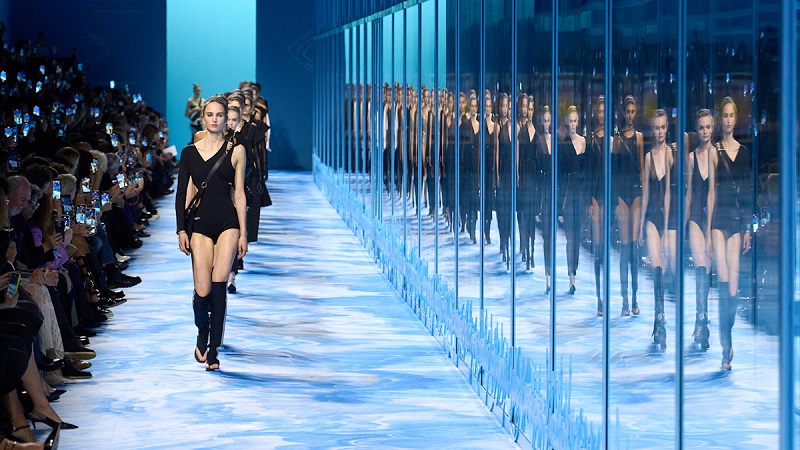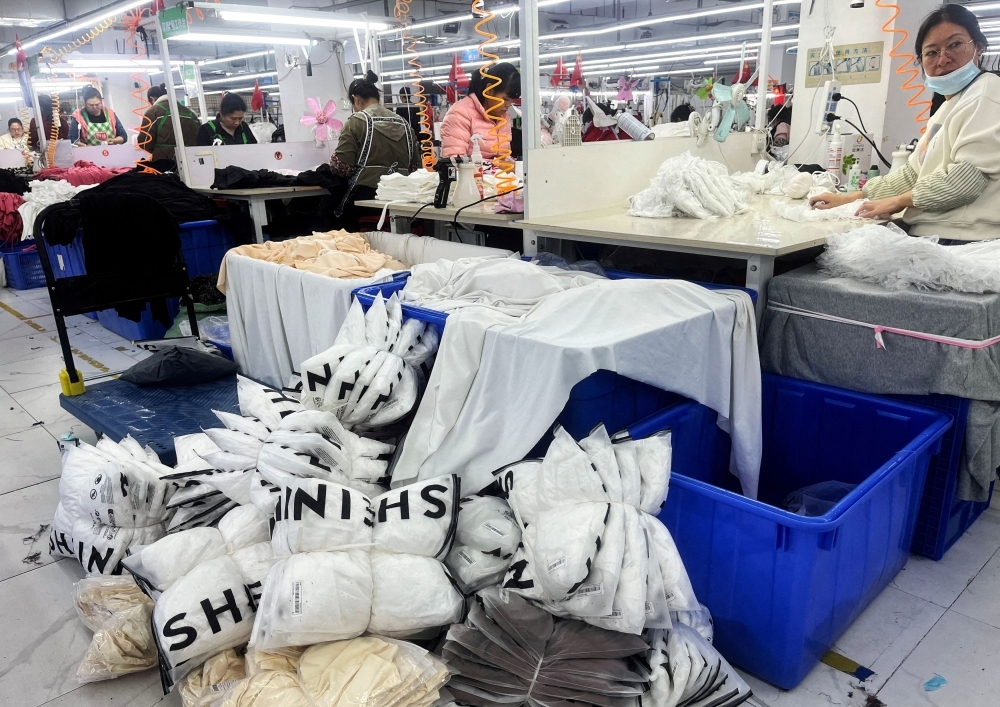FW
Vardhman Textiles has reported financial results for the period ended December 31, 2018. The company reported net sales of Rs1,789.86 crore during the period ended December 31, 2018 as compared to Rs1,727.17 crore during the period ended September 30, 2018. The company posted net profit of Rs 191.13 crores for the period ended December 31, 2018 as against Rs 195.60 crores for the period ended September 30, 2018.
On yearly basis, the company reported net sales of Rs 1789.86 crores during the period ended December 31, 2018 as compared to Rs 1685.54 crores during the period ended December 31, 2017. Net profit was Rs 191.13 crores for the period ended December 31, 2018 as against Rs 133.29 crores for the period ended December 31, 2017.
For the December quarter Sutlej Textiles’ net sales were Rs 657.35 crores as compared to Rs 693.73 crores during the September quarter. Net profit was Rs 17.29 crores for the December quarter as against Rs 24.85 crores for the September quarter. EPS was Rs 1.06 for the December quarter as compared to Rs 1.52 for the September quarter.
Net sales during the year were Rs 657.35 crores as compared to Rs 604.31 crores during the previous year. Net profit for the year was Rs 17.29 crores as against Rs 16.35 crores for the earlier year. EPS for the year was Rs 1.06 as compared to Rs 1 for the preceding year.
For the six month period net sales were Rs 1972.18 crores as compared to Rs 1877.06 crores during the same six month period the previous year. Net profit was Rs 50.77 crores as against Rs 103.35 crores for the same six month period the previous year. EPS was Rs 3.10 as compared to Rs 6.31 for the same six month period the previous year.
Sutlej is one of India’s largest integrated textile manufacturing companies. It specialises in synthetic, natural and blended yarns, all types of spun yarns and home textile furnishing.
A new report evaluated the financial viability of using post-consumer clothing and textiles as feedstock for chemical and mechanical fibre to fibre recycling operations in the UK. The study models the finances for both chemical and mechanical fibre to fibre recycling processes for recovering polycotton and cotton respectively. It highlights the pressure points, and potential returns, and outlines the barriers to developing post-consumer full fibre to fibre recycling.
The study, carried out by WRAP, suggests sorting done of clothing using near-infrared spectroscopy may be critical to the wider development of recycling. It also argues that chemical recycling processes are commercially farther off than mechanical but may offer higher economic potential in the long run.
The research was undertaken ahead of the anticipated global shortfall in virgin textiles. This predicts limitations in future cotton supplies, the UK’s most used fibre, with some projections suggesting a five-million-tonne global cotton deficit by 2020.
In 2018 Rieter’s orders were down 17 per cent compared to previous year while sales were up 11 per cent. Rieter achieved higher sales thanks to organic growth in the Business Group Machines and Systems. In addition, the acquisition of SSM Textile Machinery in the Business Group Components supported this positive development.
The Business Groups After Sales and Components were able to maintain the previous year’s levels of sales despite weaker market dynamics during the second semester of 2018.
In Asia, excluding China, India and Turkey, Rieter increased sales by 36 per cent. Sales in China fell by 19 per cent. With the phasing out of the subsidy program in the western province of Xinjiang, the demand for machinery declined. Sales in India fell by 16 per cent. In Turkey, Rieter achieved sales in a difficult market environment, thanks to the introduction of the new ring and compact spinning machines.
In Europe, Rieter increased sales by three per cent. Rieter is the world’s leading supplier of systems for short-staple fiber spinning. Based in Switzerland, the company develops and manufactures machinery, systems and components used to convert natural and manmade fibers and their blends into yarns. Rieter is the only supplier worldwide to cover spinning preparation processes as well as all for end spinning technologies.
Milan women’s fashion week to be held from February 19 to 25, 2019, will focus on new design talent, featured both on catwalk show calendar and in a number of other dedicated events and initiatives. The calendar will feature a wealth of new names, both from Italy and abroad. Young designers will be strongly supported. CNMI, the leading Italian industry association, traditionally makes it possible for a selection of emerging labels to show during the fashion week. The most promising Italian design talents will be supported via a mentorship program.
One label to debut on the fashion week’s catwalks with CNMI’s support is Marios, founded in 2002 by Cyprus-born designer Mayo Loizou and his Polish counterpart Leszek Chmielewski. This women’s wear label is currently being relaunched after the arrival of a new partner.
There are also other initiatives reserved for emerging talents through the Fashion Hub, which will run from February 20 to 24. The hub will host several shows, a series of conferences and the eighth edition of the Fashion Hub Market, which allows rookie labels to showcase their collections. For February, the roster includes 12 names. There will also be a focus on creativity coming from China and Hungary.
The University of Manchester has developed a simple and cost-effective method to manufacture graphene-based wearable electronic textiles on an industrial scale. This could easily be scaled for many real-life applications, such as sportswear, military gear, and medical clothing.
Graphene is predicted to be one of the most prominent materials in wearable e-textiles. The new technique could allow graphene e-textiles to be manufactured at commercial production rates of 150 meters per minute. In the new method, the researchers have reversed the previous process of coating textiles with graphene-based materials. Conventionally, the textiles are first treated with graphene oxide, and then the graphene oxide is reduced to its functional form of reduced graphene oxide. Instead, the researchers first reduced the graphene oxide in solution and then coated the textiles with the reduced form.
By making coating the ultimate step, it becomes possible to use a coating technique termed padding, which is currently the most commonly used method of applying functional finishes to textiles in the textile industry. For instance, water-repellent and wrinkle-free clothing are often made by padding.
E-textiles made by a laboratory-scale pad-dry unit, exhibit excellent electrical and mechanical characteristics. The reduced graphene oxide forms a uniform coating around the individual cotton fibers, which results in good electric conductivity, tensile strength, breathability, flexibility, and overall comfort of the fabric.
The CanopyStyle initiative has reached 170 brand partners with the addition of companies Abercrombie & Fitch Co., Allbirds, ELK, Reformation and Selfridges. Now eight new companies will work with Canopy to bring their innovative technologies to market at scale, with next generation enterprises Nanollose and Tyton Biosciences joining the CanopyStyle initiative.
All these partner brands will eliminate their use of Ancient and Endangered Forests, as well as advancing conservation solutions in landscapes of hope such as Sumatra’s Leuser Ecosystem, Vancouver Island’s rainforests and the Broadback Forest in the Canadian Boreal.
Over the last year, Canopy and its brand, retail and design partners have catalysed significant transformation of the viscose supply chain. Through work with producers and other industry stakeholders, companies representing 52 per cent of global viscose supply have completed the CanopyStyle Audit process, which assesses supply chain risk, recommends measures to reduce impact on forests and tracks corporate progress on innovative fibers.
To be hosted on the dedicated Ecopack stage, The Big Plastics Debate will welcome industry experts to discuss the future of plastics and reflect on the pledges made by brands over the last 12 months. Experts from some of the world’s biggest brands, including Marks & Spencer, Pepsi Lipton, together with British Plastics Federation, A Plastic Planet and WRAP, will come together at Packaging Innovations 2019 to discuss plastics in packaging.
The highly anticipated debate will be held from February 27-28, 2019 in Birminham. Day one of the debate will kick off with the Ecopack Challenge, welcoming six companies, who will present their innovative sustainable packaging solutions for the chance to work with Marks & Spencer, and the crown of Ecopack Challenge Winner for 2019. This will be followed by The Big Debate, where two teams will go head to head to debate whether plastic packaging will always play a fundamental part in our everyday lives.
Day two will see expert panels tackle two key areas of the circular economy, ‘Designing Packaging for a Circular Economy’ and the ‘Recruiting Consumers for a Circular Economy’.
Farfetch, an online fashion retailer based in the UK, has stopped the sale of fur. Farfetch has traditionally been a fur-heavy retailer. Other retailers who have banned fur are Net-a-Porter, Gucci, Michael Kors, Versace, Burberry, DKNY, Coach, Chanel, Jean Paul Gautier and Jimmy Choo.
Each new fur-free announcement continues the domino effect of designers and retailers seeing the importance of distancing their brands from the fur industry’s cruelty. However fashion houses like Fendi and Dolce and Gabbana are still selling fur.
The UK currently allows the import and sale of furs from a variety of species, including foxes, rabbits, minks, coyotes, raccoon dogs and chinchillas. Under existing EU regulations, import and sale of fur from dogs, cats and commercial seal hunts are banned, and campaigners want those bans extended to protect all species.
Brands like Calvin Klein, H&M, Marks & Spencer, Tommy Hilfiger, and Topshop have dropped angora wool from their clothing lines. Angora rabbit fur is being used for sweaters, hats, gloves, and more. Angora rabbits have long, soft fur. Most angora comes from rabbits on Chinese factory farms. The rabbits writhe in agony as workers tie them down and rip out their fur. So far more than 300 major retailers have banned angora.
Leather Fashion Show was held in Chennai on January 31, 2019. A showcase of what’s trending in the world of leather, it had vegan leather, leatherite along with trendy biker jackets, handbraided bags, rivets and rhinestones.
From casual wear to boho chic, stylish models sashayed down the ramp in some interesting styles--hot pants, skirts, biker jackets, athleisure and even chic formals. But the real stars were the handcrafted bags, footwear and accessories, from home-grown industries and a few international players.
The Indian leather industry accounts for 12.9 per cent of the world’s production of hide, with a massive three billion sq ft of leather produced annually. The leather fashion industry, though, is still taking baby steps. Big players are slowly moving from the export space into the domestic retail market.
The leather garment industry is still trying to make its foray into fashion, while leather bags and shoes fly quicker off the shelves. The industry offers better options than China and is now focusing on soft skills and increasing value so that it can market products under our own brand identity.
Indian consumers look at leather as a practical buy not luxury. So, natural leather jackets with a vintage, distressed look are not an easy sell.












